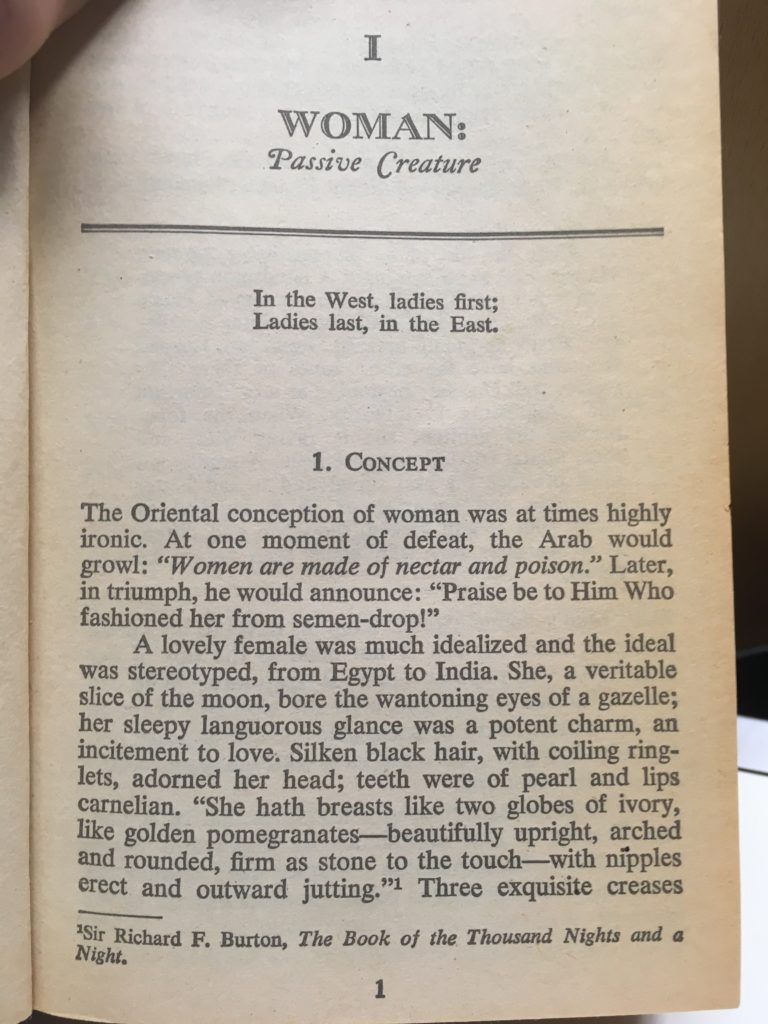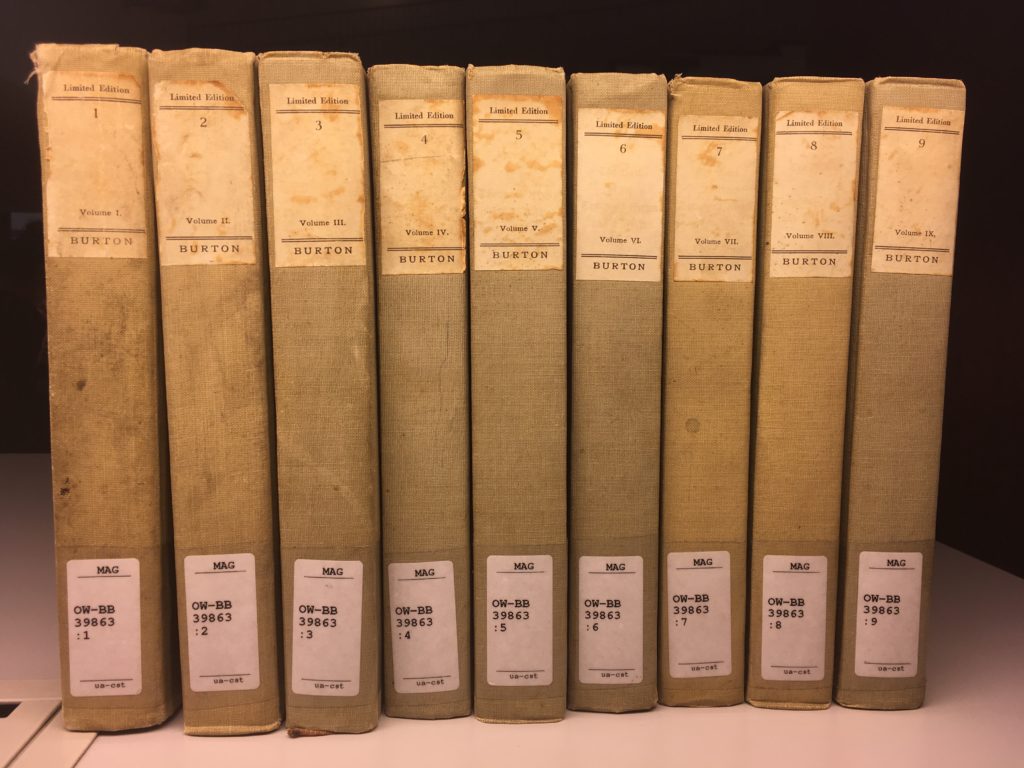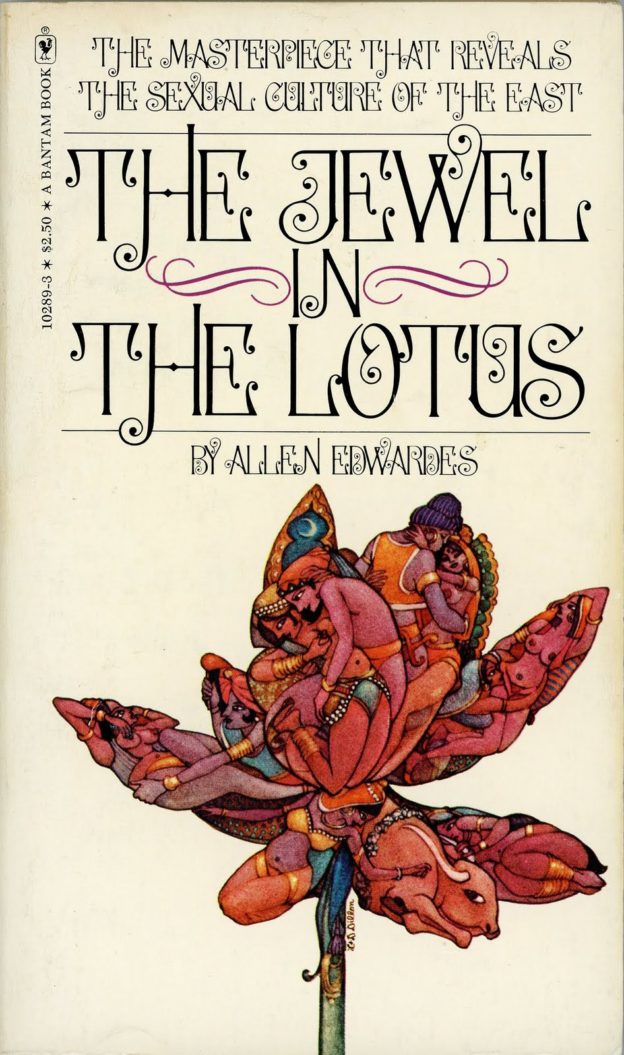Yesterday, as I was browsing through my translation of The History of Erotica, because of my kindled interest in eastern erotica (brought about by Onfray’s book Le Souci des plaisirs (I’ll tell you about this later)), I fell upon the “breasts like two globes of ivory” citation which I had attributed to One Thousand and One Nights when writing my book. The only trouble, when I started googling, I could not find it in digital copies of One Thousand and One Nights, only in a Google Books copy of The Jewel in the Lotus.

Luck had it that the UA library has The Jewel in the Lotus in its collection so I got it today (13/11/19) and there it was, on page 1, “She hath breasts like two globes of ivory, like golden pomegranates ― beautifully upright, arched and rounded, firm as stone to the touch ― with nipples erect and outward jutting,” with a footnote sourcing it to Burton’s The Book of the Thousand Nights and a Night.
Still, however hard I tried, I could not source it in that book.
But I read the entire Jewel book and here are some notes:
In the preface the The Jewel in the Lotus has “lucrative sinks of iniquity peopled by degenerate niggers,” without footnote, does it refer to Burton?
And on page 49, various descriptions of the female pudenda by Burton:
” When he beheld them stripped of their clothes, his chord stiffened for that looking at them mother-naked he saw what was between their thighs, and that of all kinds, soft and rounded, plump and cushioned ; large-lipped, perfect, redundant and ample, and their faces were as moons and their hair as night upon day”
“He cast a glance at the chief damsel and there was manifest to him what was between her thighs, a goodly rounded dome, like a bowl of silver or crystal.”
“parts softer than silk; white, plumply-rounded, protuberant, resembling for heat the hot room of the bath”
This being a work of sexual anthropology, it references many travelogue-like sources Such as Alexander Hamilton‘s New Account of the East Indies [1]:
“The Veyraugee, an austere type of Shivite holy man, is a sect of mendicant priests. An early traveler to India” thus described a Veyraugee: I have seen a fanciful Rascal, seven Foot high with a large Turband of his own Hair wreathed about his Head, and his Body bedaubed with Ashes and Water, sitting quite naked under the Shade of a Tree, with pudendum like an ass.”
Burton on harem castration on pp. 174-5, many of which I cannot find the source in Burton’s text:
“begged her to reveal her intent; and finally, after I was well secured, she said unto me: ‘I bear the intention of removing thy precious stones, the honours of thy yard. I must also apply the blade to thy pizzle.” –unsourced
“and I wept over myself for that I was become even as a woman, without manly tool like other men.” [2]
One of the most valuable bits of The Jewel is its bibliography, which shows some overlap with Ethnography : Castes and Tribes. Main sources are R. F. Burton, Jean-Antoine Dubois (Hindu Manners), Paul Lacroix, Kama Kalpa by P Thomas.
“The Turk ruled the Arab, for there thrived in him savage ambition. The Arab possessed subtle genius, but the Turk had keen emotional drive.”
Note:
“This pattern of temperament has certainly not changed, as witnessed by the current Middle Eastern crisis.”–p. 187″It was the starving negro hunting the elephant, the starving Arab hunting the Negro, and the ravenous Turk hunting the Arab to hunt the Negro.”, source: The Mahdi of Allah, Richard. A. Bermann
The book mentions the braguette, and cites the Essays by Montaigne on this regard.
A few days later, it dawned upon me where I had found the “breasts like two globes of ivory” citation, it was in The Erotic Arts, there on page 84 is the famous quote. It refers to footnote 9 on page 444 which refers to Edwardes again.
But still, mysteriously, I cannot find it in Burton’s online texts.

A few days later, I discover that my library has Burton’s translation in its collection, kept in the warehouse. I order it and when it came, surprise, nine volumes only, the tenth, which features the so-called “Terminal Essay” which I was most looking forward to, was not in the collection anymore, I imagine it stolen.

